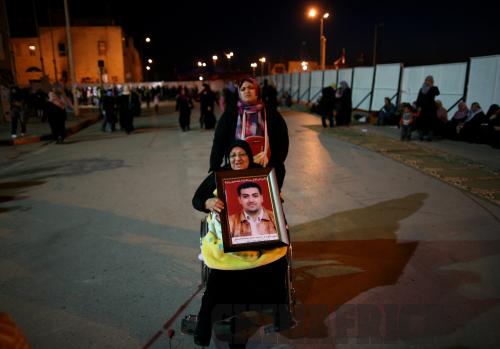|
 |
|
A woman mourns for her son (NA SAIER) |
"So, are you Pro or Against?" This is the question I am most asked and that which I most despise ever since leaving Libya for Europe when the conflict began three months ago. Through the course of the conflict my thoughts and feelings shifted and continued to whirl round and round in an effort to seek truth, justice and sometimes, just to understand what was going on.
Being a Libyan national and having lived in Libya for almost 6 years I witnessed the society and life that was so unique to Libya. I'm not talking about a war-torn, divided nation where one now has pity on you the moment you mention where you're from, I'm talking about the Libya that was safe and secure with a modest subsidised way of life and most notably a sense of pride I have always felt.
Of course behind the Libya of the 21st century that we know is one man. Sometimes absurd, sometimes exaggerated and plain right outspoken, Colonel Gadhafi has been known the world over for his views and stances in geo-politics that has had masses of people admire him across the globe. It's perhaps this unequivocal image that Gadhafi portrays on the world stage that explains his entire four-decade rule under the magnifying glass of the West. Indeed, domestically things in Libya could have always been better – healthcare was poor, housing a big issue for thousands of Libyans and infrastructure virtually out of sync with modern day standards. However, the money is there, which doubtless indicates that Libya's greatest enemy internally was and is corruption. There is no doubt about that.
It was these problems that most people blamed for the conflict. Libya was indeed advancing as a nation but at a slow pace it must be said. The Arab world conflict was in full swing and the momentum after Hosni Mubarak's toppling next door in Egypt set the scene. Social networking was shut down almost immediately and the Internet as a whole followed shortly after. As a result, I found myself in a place watching or hearing the events unfold with minimal access to my own research and mostly subject to television media – most of which was non-Libyan. As the crisis began to expand with everyday that went by, it was absolutely apparent that force was being used and skirmishes were indeed happening within the country.
Shock, horror, regret and bitterness are how I could describe my initial and increasing sentiment toward the Libyan approach to the conflict. Civilians being massacred, food shortages, a bloodbath on the streets and floods of "Libyan" refugees fleeing the war torn country are some of the soundbites that penetrated our subconscious. My point is that there is no doubt that certain areas of Libya were the focus of local unrest, particularly in the Eastern cities, but to assume that this wave of anti-governmental posturing and that the disastrous effect of the Gadhafi regime were all around Libya, I would later understand to have been a complete farce.
|